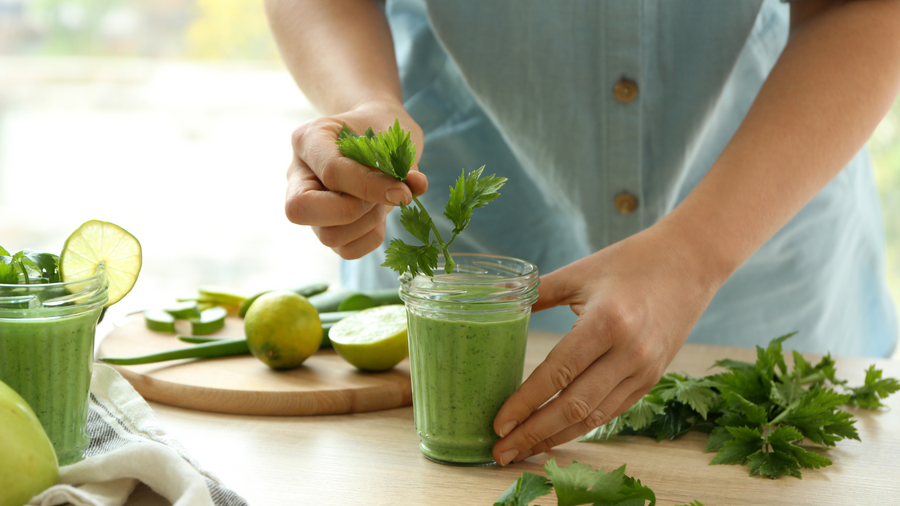Health Benefits of Cashew Milk
When you think of milk, you probably think of cow's milk. And yet, despite being a popular addition to our food and drink, there are a number of reasons why dairy could do you more harm than good. From lactose intolerance and allergies, to intestinal bleeding and heart disease, the evidence against cow's milk is growing, especially for small children.
Because of this, more people are turning to innovative non-dairy milks made from rice, soy, or nuts. These non-dairy milk options are increasing in popularity, with cashew milk being one of the front-runners. Cashew milk is an excellent low-calorie option with a creamier uniformity than other types of nut milk.
What is Cashew Milk?
Cashew milk is one of the fastest growing plant-based dairy alternatives with low-calorie content and creamy consistency. Cashew milk is prepared from a blend of whole cashews with water and is the best non-dairy product since it is more versatile, sweeter, and creamier.
You can choose to prepare homemade cashew milk or buy the ready-made type. Cashew milk is rich in vitamin E but lacks protein and fiber. As a result, cashew milk has lower calories than dairy milk, oat milk, and coconut milk. However, store-bought cashew milk is fortified with vitamin D, vitamin A, calcium, and iron to offer you more health benefits. Either way, cashew milk is a perfect alternative for dairy milk allergies and lactose intolerance.
What is the difference between almond milk, cashew milk, oat milk, regular cow’s milk?
Cow’s Milk
Dairy milk contains natural sugars, proteins, and fats. For instance, 1 cup of whole milk has about 150 calories while fat-free milk has 83 calories. Whole milk has 8g of protein and 8g of fat per serving, while low-fat milk has 1.5g of fat. Note that 5g of the 8g of fat in whole milk is saturated fat.
It is important to remember that the naturally existing sugars in dairy milk can trigger a blood sugar increase. At the same time, saturated fats can raise your risk of heart disease.
Almond Milk
Despite being rich in vitamin E, almond milk has a lower calorie content than dairy milk. For instance, 1 cup of unsweetened almond milk contains about 30-45 calories and 2g fat. You can also use almond milk for your cooking purposes or add it to your morning coffee.
Almond milk provides small amounts of protein and fiber, so you’ll need to use something else to compensate for the lacking nutrients. When buying almond milk, it is advisable to choose the unsweetened since the sweetened version contains plenty of added sugar. Also, it is best to avoid almond milk if you have a nut allergy; you can use other alternatives such as rice milk, soy milk, etc.
Oat Milk
Oat milk is plant-based milk naturally free of lactose, dairy, soy, and nuts. Oat milk is prepared by mixing oats and water, then gums, thickeners, and oil are added. Into the mixture, vitamin D, vitamin A, calcium, and riboflavin are added to strengthen or fortify the oat milk.
Oat milk has more protein and fiber than other non-dairy options, with 1 cup containing 3-5 grams of protein. However, unlike other plant-based options, oat milk has more carbs and calories, with 1 cup containing about 100 calories or more. You can use oat milk if you have food sensitivities or dietary restrictions.
Cashew Milk
Cashew milk is the best plant-based alternative for vegans or lactose intolerant individuals. It is nut-based milk with a creamy taste. It is also rich in vitamin E but low in calories. Thus, 1 cup of unsweetened cashew milk can provide 25-35 calories and a fat content of 2 grams.
Differences
Plant-based alternatives (almond, oat, and cashew milk) are dairy-free and lactose-free, making them ideal for people with dairy allergies and lactose intolerance.
Nut-based alternatives contain fewer proteins, fats, and fiber than dairy milk. Therefore, people with diet and weight issues should opt for a plant-based alternative rather than dairy.
How to Make Cashew Milk
Making cashew milk at home is easy. First, soak the cashews overnight. Then, drain excess water, grind the cashews into a paste and blend with more added water. After mixing with a powerful blender, no pulp remains. Your cashew milk is ready! Here are the steps;
- Measure 1 cup (you can toast them lightly) and soak them overnight.
- Drain and rinse the cashews
- Put the soaked cashews and maple syrup or honey into a high-powered blender and add 4 cups of water.
- Blend for one minute.
- The cashew milk is ready to drink.
- You can also pour it into a storage vessel and refrigerate it.
The refrigerated cashew milk can last for 3-4 days, but it would be best to consume it in the first 2-3 days after preparation.
Store-Bought Cashew Milk
Store-bought cashew milk is fortified with vitamins and calcium. However, depending on the manufacturer, the cashew milk may contain added sugars, small amounts of proteins, thickeners, stabilizers, flavors, and other extras. These make store-bought cashew milk last longer than the homemade version.
It is best to read the ingredients of different manufacturers before buying. You can choose unsweetened options if you don’t like additional sugars.
Benefits of Drinking Cashew Milk
Aids in losing weight
The low-caloric content of cashew milk ensures that you don’t gain weight. Thus, you will lose weight without skipping the milk as you continue your workouts.
You can improve your digestive functions with fiber content for homemade cashew milk. The improved digestive system will help you lose weight more significantly.
Cashew milk contains vitamins and minerals
Cashew milk provides your body with Calcium, Vitamin A, Vitamin D, and Vitamin K. It also has several benefits, including better bone structure, improved eyesight, and blood clotting activities.
It contains healthy fats and eliminates free radicals
Cashew milk does not contain unhealthy saturated fats. Instead, it contains unsaturated fats, good for your heart health since your body can easily break them down. Cashew milk is also rich in vitamin E and anacardic acid which helps to eliminate free radicals. Free radicals are potential causes of skin anomalies and other disastrous conditions like cancer.
Improves nerve function
Cashew milk contains B vitamins, especially riboflavin (B6), and magnesium which improve nerve functions, among other roles.
Promotes eye health
By regularly consuming cashew milk, you may increase the lutein and zeaxanthin levels in your blood which is contained in the milk. Lutein and zeaxanthin help prevent advanced macular degeneration the disease that triggers vision loss. Thus, cashew milk lowers the risk of old-age cataracts and promotes your eyes' health.
Lower risk of anemia
The iron in cashew milk helps support red blood cells production. Red blood cells circulate oxygen throughout the body with the help of hemoglobin. Inadequate production of red blood cells can cause anemia, a condition that denies your body enough oxygen leading to dizziness, fatigue, and other symptoms.
Help prevent heart disease and cancer
Cashew milk comprises monounsaturated and polyunsaturated fatty acids. Consumption of these fatty acids lowers the risk of heart disease. In addition, cashew milk is rich in potassium and magnesium, minerals that improve your heart’s health and avert heart disease.
Because of its high anacardic acid content, cashew milk may help prevent the growth of some cancer cells. For instance, anacardic acid limits the spread of breast cancer cells and enhances anticancer drugs’ efficiency against skin cancer cells.
Boosts immunity
Cashew milk may help boost your immunity due to its concentration in antioxidants and zinc. Antioxidants counter inflammation and keep off diseases. Zinc is a vital mineral in forming immune cells, preventing diseases and infections. Zinc also reduces inflammation and stops cell damage.
Tips in Adding Cashew Milk to your Diet
- You can replace dairy milk with cashew milk in many recipes, such as baked goods, smoothies, and cereals.
- Since it has a creamy texture, you can add it to sauces for a creamier taste or make ice cream with it.
- You can add cashew milk to your morning coffee, tea, or hot chocolate for a creamier and delicious taste.
- You can also add cashew milk in your vegetable or chicken stock for a tasty and creamier soup.
- Cashew milk can also make a nice dairy-free salad dressing.
- You can also grab a cup of cashew milk between your meals and stay healthy.
- You can also make cashew-based cream sauces, cashew-based cheese, and sour cream.
- We've added organic cashew milk powder to our collection of organic superfood lattes as well!
Bottom Line
Cashew milk is one of the healthiest beverages you can consume every day, and it's adaptable to fit in your diet in various creative ways. The health benefits of cashew milk outweigh those of other plant-based kinds of milk, making it the best option for a healthy diet.
References:
- Cleveland Clinic https://health.clevelandclinic.org/what-you-need-to-know-when-choosing-milk-and-milk-alternatives/
- IFAS Extension. University of Florida. Plant-Based Milks: Cashew https://edis.ifas.ufl.edu/pdf/FS/FS41300.pdf
- Nourish by WebMD. Cashew Milk: Are There Health Benefits https://www.webmd.com/diet/health-benefits-cashew-milk#2
- 10 Nutrition and Health Benefits of Cashew Milk https://www.healthline.com/nutrition/cashew-milk-benefits
- How to Make Cashew Milk https://downshiftology.com/how-to-make-cashew-milk/











